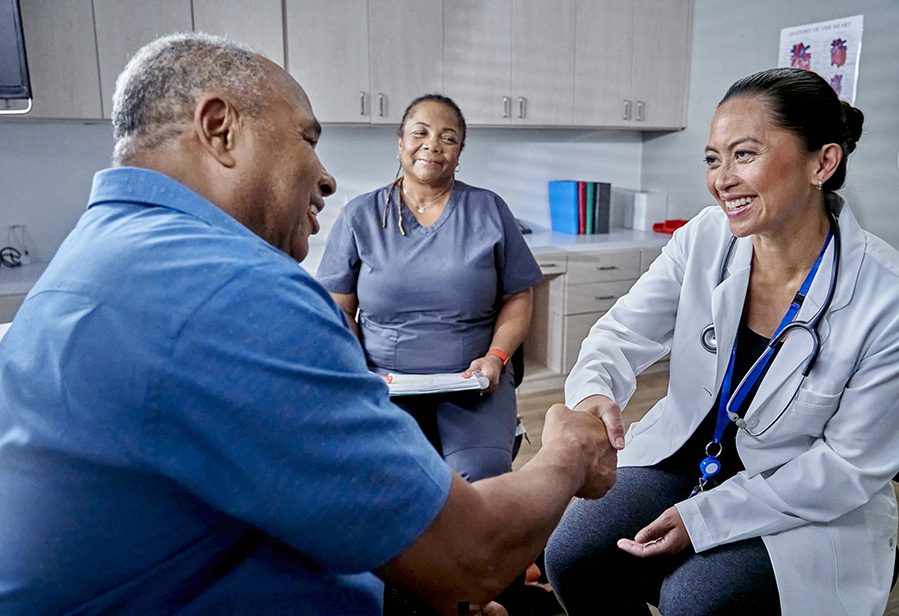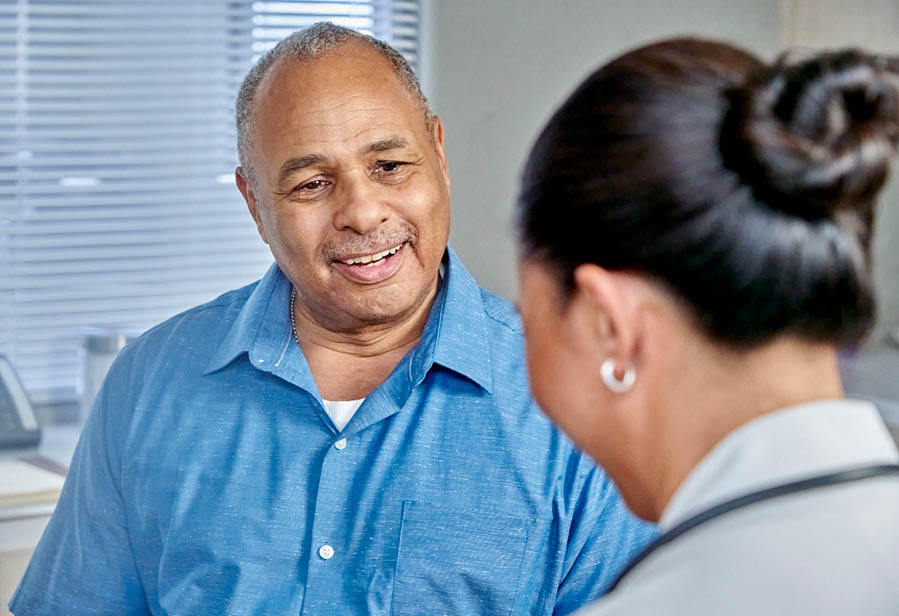Chronic obstructive pulmonary disease (COPD) is common among elders in our community. One study found that more than 10 percent of people over the age of 75 have COPD. Although the condition affects many people, it continues to challenge caregivers and individuals who want to thrive in their later years.

Managing COPD can mean many things, including proper use of medications like inhalers and lifestyle changes like quitting smoking. Reducing the risk of COPD exacerbations, where symptoms get worse for days or weeks, can help prevent lung failure and hospitalization and contribute to better health.
What are the risk factors for seniors with COPD?
There are several factors that may put you at greater risk for COPD. These include:
- Smoking
- Secondhand smoke
- Air pollution
- Childhood respiratory infection
- Workplace exposure to dust, fumes, and chemicals
- Alpha-1 deficiency, a genetic condition
According to the American Lung Association, smoking causes 85 percent or more cases of COPD. But the numbers can vary between sources. The National Institutes of Health says that up to 25 percent of people with COPD never smoked.
There are a number of ways to reduce the risk of COPD. These include avoiding exposure to secondhand smoke and air pollution. Also, if you smoke, it’s a good idea to quit.
Who is at risk?
COPD is more common in older people. Symptoms normally start at the age of 40 or older. If you have alpha-1 antitrypsin (AAT) deficiency, you may experience signs of COPD at a younger age.
What are the early signs of COPD and how is it diagnosed?
Some signs of COPD in its early stages include:
- A persistent, ongoing cough
- A cough with mucus
- Shortness of breath, especially while active
- Wheezing sound when you breathe
- Tightness in the chest
As COPD progresses, these signs normally get worse. More advanced COPD can cause swelling of the ankles and legs, weight loss, muscles that get tired more quickly.
Your doctor will take your medical history and use your signs and symptoms to diagnose COPD. Your doctor will ask if you smoke or have exposure to irritants, such as dust and chemicals.
They will also perform some lung function tests. One such test is spirometry, where you breathe as hard as you can into a tube.
The results of the spirometry, combined with your symptoms, help doctors to determine the severity of the COPD. Doctors often use the Global Initiative for Chronic Obstructive Lung Disease (GOLD) table to establish whether your COPD is mild, moderate, severe, or very severe.
What are the most common causes of COPD?
COPD happens as the result of chronic inflammation of lung tissue. This inflammation destroys healthy lung tissue, resulting in emphysema. The body creates scar tissue to try to repair the damage, which results in small airway fibrosis. For people with COPD, this leads to less airflow, which means it’s harder to breathe.
Alpha-1 antitrypsin deficiency, a genetic condition, is a risk factor for COPD. But the most common causes of COPD are toxins that you breathe, such as:
- Cigarette smoke, from smoking or inhaling second-hand
- Airborne pollutants, from biomass fuels and other sources
- Occupational irritants, from dust and chemicals
You don’t need to have smoked to get COPD. But smoking is a major risk factor for developing the condition.
How can seniors manage and treat COPD?
Seniors can make lifestyle changes, such as quitting smoking, to help manage COPD. You can also work closely with your doctor to stay up-to-date on medications and treatments to make sure they are reducing your symptoms.
It is also important to take steps to reduce the risk of COPD exacerbations. These are periods of time when COPD gets worse. To reduce exacerbations, your medical team may recommend:
- Smoking cessation
- Annual flu vaccine
- Avoiding air pollution
- Inhaled steroids
- Long-acting bronchodilators
You can work with your doctor if it is hard to use your inhaler correctly. For example, it is common for seniors to find it hard to hold their inhaler. There may be other ways you can manage symptoms and still take your medication as prescribed.
What are the types of treatments?
Your doctor may recommend a combination of lifestyle changes along with medication to manage COPD. In some cases, surgery to remove damaged lung tissue or remove lung spaces are also options.
Medications are usually inhaled to reduce inflammation and to reduce tension in the muscles around your airway. Here is a longer list of potential treatments for COPD:
- Inhaled bronchodilators (long-acting and short-acting) to relax airway muscles
- Inhaled steroids to reduce airway inflammation
- Combination inhalers (bronchodilators and steroids)
- Nebulizer to assist with inhaled medications
- Oral steroids for short-term use or exacerbations
- Phosphodiesterase-4 inhibitor to decrease inflammation and relax the airways
- Oxygen therapy
- Pulmonary rehabilitation (exercise, nutrition, and counselling to support lung health)
- Surgery (lung volume reduction, bullectomy, lung transplant)
Why should you limit COPD exacerbation in seniors?
Some people experience acute exacerbation of COPD. This is when symptoms get worse for days or weeks. Exacerbation may be the result of an inflammatory trigger, such as:
- respiratory infection
- air pollution
Exacerbations require treatment. If exacerbations are left untreated, the result can be lung failure. Your doctor may recommend additional intervention such as:
- antibiotics
- supplemental oxygen
- steroids
- hospitalization
Your doctor can help you to manage your COPD long-term to reduce the risk of exacerbations.
How can you help your loved one with COPD?
COPD can be a challenging diagnosis for the person and their caregivers. If your loved one has COPD, there are a number of ways you can offer support.
- Help them to quit smoking
- Help them to keep medical appointments
- Assist with communication between medical professionals and teams
- Assist with the proper use of medications, such as inhalers
- Ask doctors about preventive measures like flu shots
- Help with daily tasks
- Consider assisted living or communal living environments if that best supports your family and loved one
- Monitor your loved one’s mental health and ask how they are doing
Any changes in your loved one’s well-being can be discussed with the doctor. They can help you find the right supports for your loved one as they continue to live with COPD.
What questions should you ask your provider?
An open line of communication is important between you and your doctor. You may have several questions about COPD that your doctor can answer. Some examples include:
- How severe is my COPD?
- What caused my COPD?
- What medications should I take?
- What if I have trouble using my inhaler?
- What if my symptoms get worse?
- What are signs of an emergency and who should I contact?
- Who can I call if I have questions?
Your doctor can also answer any questions you have about your general health, including mental health, exercise, and nutrition as you manage COPD.
Why choose a provider at Intermountain Health?
Intermountain Health is a leader in comprehensive, community-based care. Our myGeneration clinics cater specifically to seniors. Here you’ll experience longer appointments and a focus on preventive care. Your doctor can help you to manage COPD so you can improve your quality of life and spend less time in the hospital. Use our Find a Clinic tool today to find a doctor near you.
*This article is for informational purposes only and is not intended to be a substitute for medical advice or diagnosis from a physician or qualified healthcare professional.





